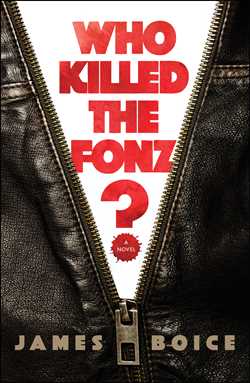Happy days are here again. At least on paper And especially in Who Killed the Fonz? (Simon & Schuster, $26), in which James Boice offers a clever reinvention of the legendary TV show, Happy Days.
The book imagines what happened to Richie Cunningham (who now goes by Richard) and the rest of the gang twenty years after the show left off. Only this time ’round, instead of a world of drive-in movie theaters and soda shops, readers are drawn into a gritty 1980s noir as Richard tries to uncover the truth about the mysterious death of Arthur Fonzarelli.

It’s October 1984, and Cunningham is having a really bad day. Having achieved some early success as a screenwriter in Hollywood, the now forty-something Richard hasn’t written a script anyone wants to buy in years.
Later that same day he gets a phone call with even worse news. His best friend from childhood back in Milwaukee, back when everyone called him Richie, is dead. Arthur Fonzarelli. The Fonz. Lost control of his motorcycle while crossing a bridge and plummeted into the water below. Two days of searching and still no body, no trace of his trademark leather jacket.
Richard flies back for the memorial service, only to discover that Fonzie’s death was no accident—it was murder. With the help of his old pals Ralph Malph and Potsie Weber, he sets out to catch the killer. Who it turns out to be is shocking. So is the story’s final twist.
When Richard travels back to his Wisconsin hometown for the memorial, he quickly finds himself drawn into a mystery surrounding his late friend—whose death may not have been an accident after all. In a time when reboots are all the rage, the fast-paced and nostalgic Who Killed the Fonz? is an ingenious twist on a beloved classic.
Who Killed The Fonz? imagines what happened to the characters of the legendary TV series Happy Days twenty years after the show left off. And while much has changed in the interim—goodbye drive-in movie theaters, hello VCRs—the story centers around the same timeless themes as the show: the meaning of family. The significance of friendship. The importance of community.
Author James Boice captures the bighearted charm of the original Happy Days, while expertly weaving in darker elements and more serious themes, like the challenge of staying connected to one’s roots and what happens when you leave home behind.
